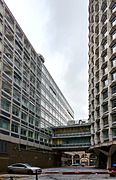One Kemble Street


One Kemble Street and Civil Aviation Authority House (CAA House), originally known jointly as Space House, is an architecturally notable building off Kingsway in the London Borough of Camden. It is a grade II listed building with Historic England. Like nearby Centre Point, it was built for the developer Harry Hyams as part of the 1960s commercial property boom and kept empty for several years after completion.
Design and construction
The building was designed by George Marsh,[1] a partner in Richard Seifert's architectural firm, for Oldham Estates, the vehicle for the developer Harry Hyams, and built between 1964 and 1968[2] by Robert McAlpine and Sons.[1] Marsh had also designed the nearby Centre Point, also for Hyams.[1] The consulting engineers were C.J. Pell & Partners.[3][4]
Space House replaced the Edwardian building Magnet House, built by Hugo Hirst for his General Electric Company in 1921,[citation needed] and comprises a rectangular eight-storey office building at 45–59 Kingsway and a cylindrical tower now known as One Kemble Street on a triangular plot to the west bounded by Kemble Street, Wild Street and Keeley Street. The cylindrical shape was chosen in order not to block the light of the buildings in those streets. The buildings are joined by a two-level enclosed walkway. Underneath the building is a car park that originally had a mini filling station.[1]
The 16-storey tower was built using a façade of precast cruciform blocks of white concrete joined by dowels and dry grout.[2][5] They were laid out in a grid pattern to allow fast and low-cost construction without the need to use a scaffold.[1] Each block is of 10 feet (3.0 metres) diameter, the same height as each storey, with a precast concrete floor panel forming the base of each storey and radiating out from a central core. The base of the tower incorporates Y-shaped columns of capstone concrete[5] as also used at Centre Point.[3] The concrete units in the building were made by Portcrete Limited.[5]
The eight-storey block on Kingsway, now known as CAA House, was also built using precast concrete blocks, with the addition of a row of central supporting columns. It was laid out with a large central office space and services and circulation at each end of the building.[1]
Later history
The building was first let to the Civil Aviation Authority (CAA) in 1975. It had large-scale refurbishments in 1996 and 2003.[1] It was listed grade II with Historic England in January 2015.[1][6] The Kingsway block is now known as CAA House while the tower has been renamed One Kemble Street and has tenants such as the main office of the Government Legal Department[7] and the Office of Rail and Road.[8] The CAA's lease ended in December 2019 and these agencies have since vacated the building.[9]
Redevelopment
The Civil Aviation Authority left the building and as of 2022 it is being redeveloped by Seaforth Land.[10] The redevelopment will remove the plant floor at the top of the tower and replace with a "facsimile" floor and another set back.[11]
Gallery
-
Covered walkway between buildings
-
Entrance to tower with Y-shaped supporting blocks
-
Underground car park entrance
-
Keeley Street elevation of Kingsway block
References
- ^ a b c d e f g h Historic England. "Space House (now Civil Aviation Authority House) (1421847)". National Heritage List for England. Retrieved 10 January 2017.
- ^ a b Pevsner, Nikolaus & Bridget Cherry. (2002). The Buildings of England: London 4 North. New Haven & London: Yale University Press. p. 315. ISBN 0300096534.
- ^ a b 1 Kemble Street. Archived 10 January 2017 at the Wayback Machine skyscrapernews.com 11 February 2015. Retrieved 12 January 2017.
- ^ Donald Insall Associates (May 2019). "Space House, 1 Kemble Street & 43-59 Kingsway WC2, Historic Building Report and Heritage Views Impact Assessment for Seaforth Land". Archived from the original on 10 June 2022. Retrieved 10 June 2022.
- ^ a b c "Space House Kingsway London" Archived 13 January 2017 at the Wayback Machine, Concrete Quarterly, 74 (July–September 1967), pp. 36–38.
- ^ What makes one tower worth saving and another wrecking? why the work of architect Richard Seifert should win protection. Archived 16 January 2017 at the Wayback Machine Robert Bevan, Evening Standard, 11 November 2014. Retrieved 14 January 2017.
- ^ Government Legal Department. Archived 12 January 2017 at the Wayback Machine Retrieved 14 January 2017.
- ^ Our offices. Archived 10 January 2017 at the Wayback Machine Office of Rail and Road. Retrieved 14 January 2017.
- ^ Nick Hill (2 May 2018). "Seaforth Land completes acquisition of West End asset in £165m deal". Bdaily News. Archived from the original on 10 June 2022. Retrieved 10 June 2022.
- ^ "Space House". Seaforth Land Holdings. n.d. Archived from the original on 16 February 2022. Retrieved 10 June 2022.
- ^ "Squires cleared for Space House booster bid". Building Design. 29 October 2019. Archived from the original on 20 June 2021. Retrieved 10 June 2022.
External links
![]() Media related to 1 Kemble Street at Wikimedia Commons
Media related to 1 Kemble Street at Wikimedia Commons




